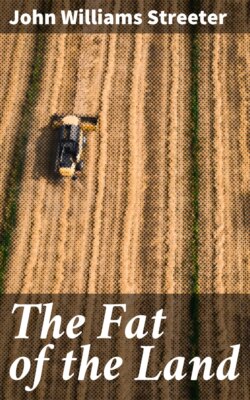Читать книгу The Fat of the Land - John Williams Streeter - Страница 16
На сайте Литреса книга снята с продажи.
THE HORSE-AND-BUGGY MAN
ОглавлениеAugust 3 found me at Four Oaks in the early afternoon. A great hollow had been dug for the cellar, and Thompson said that it would take but one more full day to finish it. Piles of material gave evidence that the mason was alert, and the house-mover had already dropped his long timbers, winch, and chains by the side of the farm-house.
While I was discussing matters with Thompson, a smart trap turned into the lot, and a well-set-up young man sprang out of the stylish runabout and said—
"Dr. Williams, I hear you want more help on your farm."
"I can use another man or two to advantage, if they are good ones."
"Well, I don't want to brag, but I guess I am a good one, all right. I ain't afraid of work, and there isn't much that I can't do on a farm. What wages do you pay?"
I told him my plan of an increasing wage scale, and he did not object. "That includes horse keep, I suppose?" said he.
"I do not know what you mean by 'horse keep.'"
"Why, most of the men on farms around here own a horse and buggy, to use nights, Sundays, and holidays, and we expect the boss to keep the horse. This is my rig. It is about the best in the township; cost me $280 for the outfit."
"See here, young man, this is another specimen of farm economics, and it is one of the worst in the lot. Let me do a small example in mental arithmetic for you. The interest on $280 is $14; the yearly depreciation of your property, without accidents, is at least $40; horse-shoeing and repairs, $20; loss of wages (for no man will keep your horse for less than $4 a month), $48. In addition to this, you will be tempted to spend at least $5 a month more with a horse than without one; that is $60 more. You are throwing away $182 every year without adding $1 to your value as an employee, one ounce of dignity to your employment, or one foot of gain in your social position, no matter from what point you view it.
"Taking it for granted that you receive $25 a month for every month of the year (and this is admitting too much), you waste more than half on that blessed rig, and you can make no provision for the future, for sickness, or for old age. No, I will not keep your horse, nor will I employ any man whose scheme of life doesn't run further than the ownership of a horse and buggy."
"But a fellow must keep up with the procession; he must have some recreation, and all the men around here have rigs."
"Not around Four Oaks. Recreation is all right, but find it in ways less expensive. Read, study, cultivate the best of your kind, plan for the future and save for it, and you will not lack for recreation. Sell your horse and buggy for $200, if you cannot get more, put the money at interest, save $200 out of your wages, and by the end of the year you will be worth over $400 in hard cash and much more in self-respect. You can easily add 1200 a year to your savings, without missing anything worth while; and it will not be long before you can buy a farm, marry a wife, and make an independent position. I will have no horse-and-buggy men on my farm. It's up to you."
"By Jove! I believe you may be right. It looks like a square deal, and I'll play it, if you'll give me time to sell the outfit."
"All right, come when you can. I'll find the work."
That day being Saturday, I told Thompson that I would come out early Monday morning, bringing with me a rough map of the place as I had planned it, and we would go over it with a chain and drive some outlining stakes. I then returned to Exeter, found the carpenter and the plumber, and accepted their estimates—$630 and $325, respectively. The farm-house moved, finished, furnished, and heated, but not painted or papered, would cost $2630. Painting, papering, window-shades, and odds and ends cost $275, making a total of $2905. It proved a good investment, for it was a comfortable and convenient home for the men and women who afterward occupied it. It has certainly been appreciated by its occupants, and few have left it without regret. We have always tried to make it an object lesson of cleanliness and cheerfulness, and I don't think a man has lived in it for six months without being bettered. It seemed a good deal of money to put on an old farm-house for farm-hands, but it proved one of the best investments at Four Oaks, for it kept the men contented and cheerful workers.
